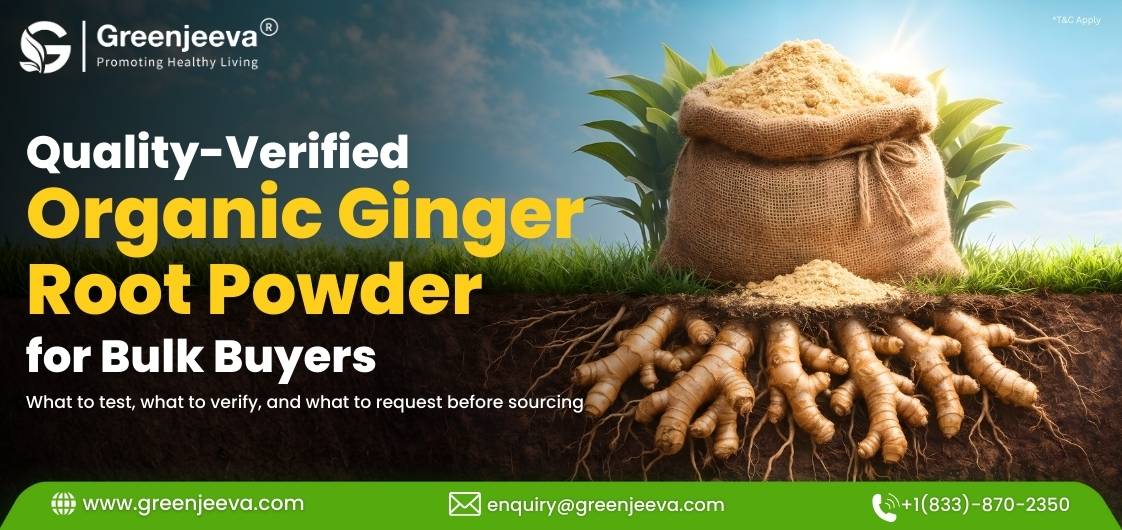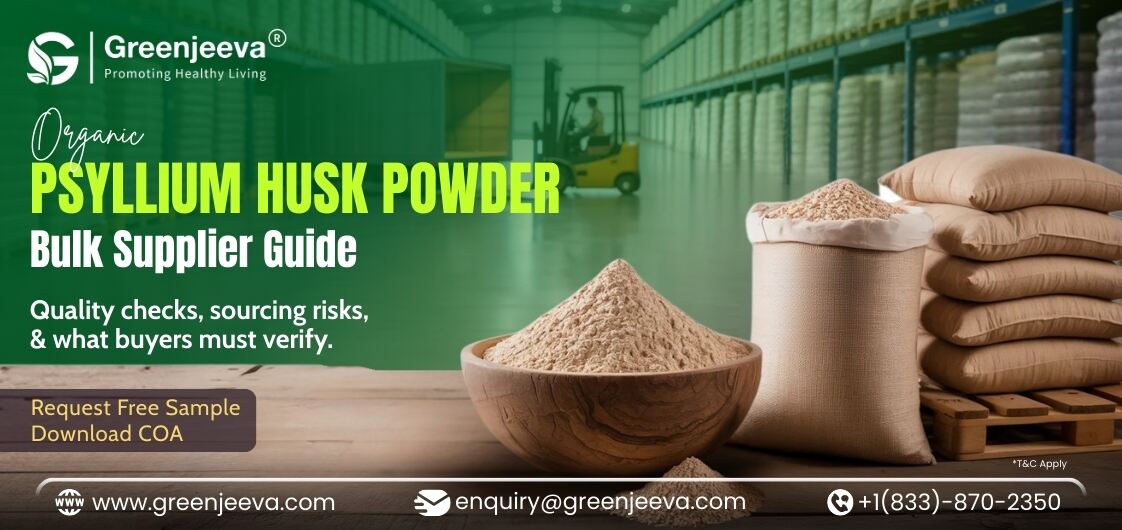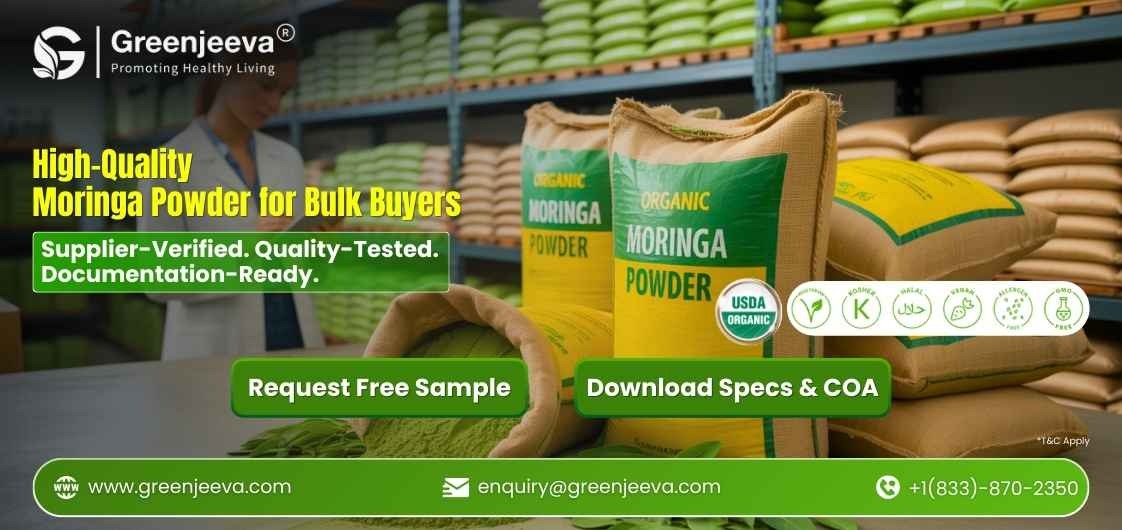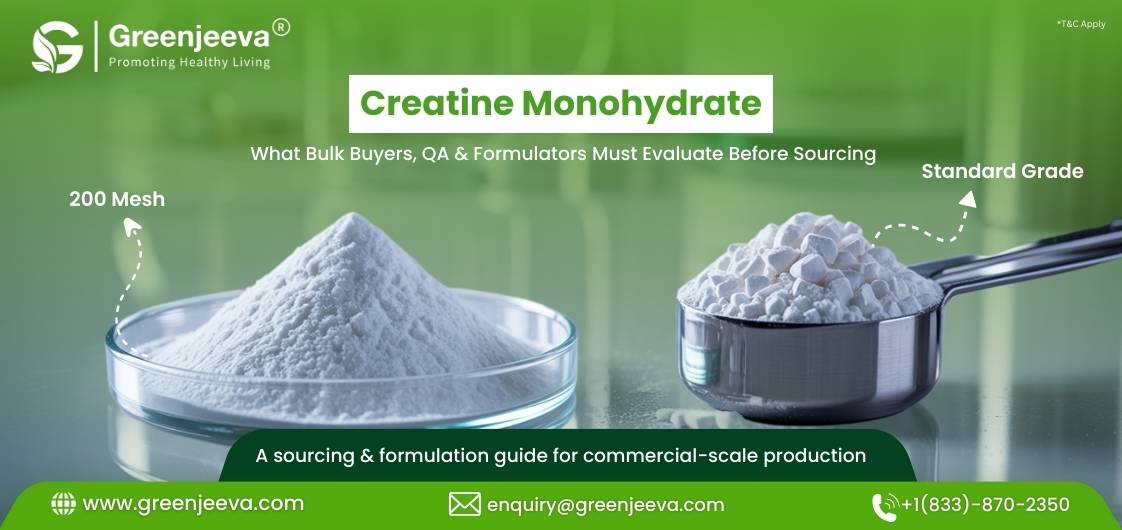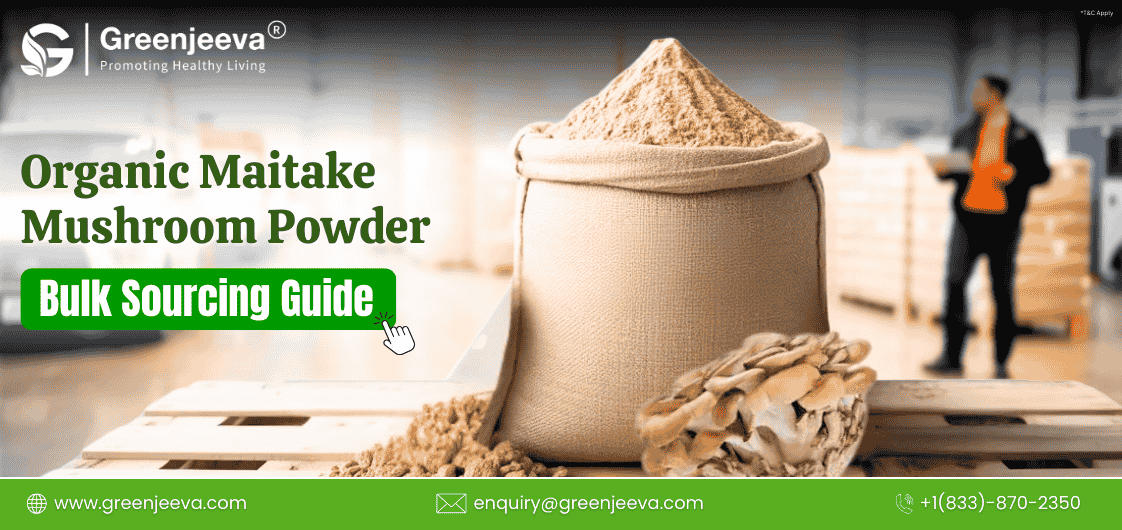5 Things Sourcing Managers Must Check Before Buying Organic Ginger Root Powder in Bulk

Sourcing organic ingredients in bulk shouldn’t feel like walking a regulatory tightrope—but often, it does.
You’re juggling lead times, supplier credibility, changing COAs, and pressure from your formulation team to maintain consistency batch after batch. Meanwhile, marketing’s pushing for clean-label everything with USDA certifications and Non-GMO claims to boot.
Now imagine this: You finally find a vendor offering organic ginger root powder bulk—but the COA doesn't match your spec sheet, and you realize the ginger is irradiated. You just lost a week… and possibly a client.
Whether you’re sourcing for supplements, functional foods, or herbal blends, ginger powder is no longer a spice—it’s a performance-critical botanical.
So before you approve that PO or lock in a vendor for the year, here are 5 key things sourcing managers must check to protect product integrity, brand compliance, and your own sanity.
Because in B2B procurement, you don’t just buy an ingredient—you commit to its risks.
1. Is the Ginger Root Powder Certified USDA Organic and Non-GMO?
Why Certifications Matter in Clean-Label Sourcing
In today’s marketplace, claims like “organic” and “non-GMO” are more than marketing buzzwords—they are compliance touchpoints and consumer trust signals. If your end-use product bears clean-label promises, sourcing uncertified or loosely labeled ingredients can put you at risk of audits, recalls, or consumer backlash.
Choosing a USDA Organic Ginger Root Powder Supplier ensures that the ginger has been grown without synthetic fertilizers, pesticides, or irradiation. This is particularly crucial in the nutraceutical industry, where your ingredients don’t just flavor a product—they define its function and safety.
Similarly, opting for a non-GMO ginger powder for supplements helps meet standards required by third-party certifiers and retailers alike. Non-GMO status also expands your product’s global market eligibility.
Always validate certifications. Ask for USDA certificates, third-party audits, and verification of compliance with the National Organic Program (NOP). Be sure the supplier’s documentation aligns with your internal compliance requirements and can support label claims.
This first check sets the foundation for a clean, transparent supply chain—because in B2B sourcing, documentation is as valuable as the ingredient itself.
2. What Are the Botanical and Functional Specifications of the Ginger Powder?
Active Compounds and Testing Parameters
Sourcing managers are expected to do more than just buy—they’re expected to ensure that ingredients meet the exact needs of formulation, efficacy, and stability. And that starts with understanding the botanical identity of the ingredient.
Look for ginger that is botanically identified as Zingiber officinale powder. That name should appear clearly on the COA (Certificate of Analysis) and product spec sheet. For functionality, check for key active compounds—especially gingerols, which give ginger its sensitivity reducing and thermogenic properties.
Verify other technical details too:
-Mesh size (does it suit your application—tea bag, capsule, RTM drink?)
-Moisture content (critical for microbial stability and shelf life)
-Purity checks (important for food safety and GMP compliance)
Requesting a COA and MSDS
Always ask for a current COA to validate the above specs, along with an MSDS (Material Safety Data Sheet) to understand any storage or handling precautions. If your end product is temperature-sensitive or requires extended shelf life, verify thermal processing methods.
If you’re sourcing dehydrated ginger powder for nutraceuticals, ask about the drying method. Low-heat dehydration helps retain volatile oils and bioactives—essential for functional claims and sensory performance.
In short: don’t just source ginger—source purpose-ready ginger.
3. Does the Supplier Offer Ingredient Traceability and Transparent Sourcing?
Why Ingredient Origin Matters for Compliance
Would you buy a premium ingredient without knowing where it came from? For sourcing managers, that’s not just risky—it’s unacceptable.
Traceability is essential for regulatory audits, product recalls, and compliance with certifications like USDA Organic and Non-GMO Project. It also speaks volumes about supplier integrity.
Ensure your compliant bulk ingredient sourcing includes detailed transparency around:
-Country of origin (climate affects phytochemical profile)
-Harvest cycle and lot numbers
-Farming practices (organic soil integrity, no pesticide drift)
Also Read:Ginger Powder: An Ingredient for Food Innovation
Clean-Label Supply Chain Visibility
If you're working with clean-label botanical ingredients, your downstream buyers or internal quality teams may request source documentation—even photos or third-party audit results.
Brands marketing Ayurvedic or traceable sourcing stories especially benefit from this visibility. Transparency is no longer a differentiator; it’s a buyer expectation.
A good supplier will offer:
-Full lot traceability
-QR or blockchain-enabled tracking (bonus)
-Certifications accessible with a single click
Working with a vendor who takes traceability seriously is about more than checking boxes—it’s about building a resilient, scalable supply chain.
4. Is the Ginger Powder Suitable for Your End-Use Application?
Food, Supplement, and Cosmetic Compatibility
Bulk ginger powder for food manufacturing isn’t always the same as ginger for supplements or skincare. Application specificity matters—especially when texture, aroma, or solubility can affect the product experience.
If you’re manufacturing:
-Teas or functional beverages: Look for fine-mesh, water-soluble powder
-Supplements: Ensure low-moisture and appropriate bulk density
-Topicals or oils: Ask for oil-extracted or solvent-free options
The drying method affects potency and performance. Some suppliers offer low-heat dehydrated ginger powder for nutraceuticals, which retains higher gingerol levels ideal for therapeutic formulas.
Formulation Needs & Application Tests
Before purchase, run application tests. Does it blend well? Does the ginger smell fresh or burnt? What’s the color profile? If you’re sourcing for Ayurvedic botanicals for functional foods, the sensory profile must match ancient formulation standards and consumer expectations.
Ask for product data sheets with test use-case results. Many reputable suppliers will provide a technical dossier or pilot-lab data to help you validate.
Remember: the right ingredient is one that fits your formulation context, not just your price point.
5. Does the Supplier Support Scalable, Reliable Fulfillment?
Inventory, Lead Times, and PO Integration
Even the most compliant ingredient loses its value if it’s stuck in transit or goes out of stock when production begins. A good USDA Organic Ginger Root Powder Supplier offers consistent stock levels, predictable lead times, and clear visibility of fulfillment windows.
Evaluate:
-Minimum Order Quantities (MOQs)
-Stock availability through B2B platforms
-Warehousing and 3PL capabilities
If you’re scaling across multiple SKUs or countries, you’ll want a vendor that understands PO cycles, Just-in-Time shipping, and bulk ginger powder for food manufacturing logistics.
Support Beyond Purchase
Procurement doesn’t end after payment. Reliable suppliers also offer:
-Post-sales documentation access (COAs, MSDS, Organic Certs)
-Sample availability for future batches
-Responsive customer service critical when working on time-sensitive launches
A digital edge also helps suppliers who let you buy organic ginger powder wholesale through a real-time B2B portal save hours in back-and-forth.
Ultimately, the true test of a supplier is not just product quality but whether they scale with your operation.
Conclusion: Smart Sourcing Starts with the Right Questions
Organic ginger root powder might be common—but quality, compliance, and functional integrity are not. Whether you're sourcing for a supplement brand or a line of Ayurvedic teas, the right supplier is the one that checks all five boxes: certification, specifications, traceability, application fit, and fulfilment reliability.
At Green Jeeva, we’re more than just a USDA Organic Ginger Root Powder Supplier—we’re a sourcing partner who understands the pressures of procurement, the importance of documentation, and the value of consistency.
Explore our ingredient specs, request a COA, or talk to our sourcing consultants today.
Buy Organic Ginger Powder Wholesale to experience supply chain confidence, batch after batch.
Disclaimer:
This blog is intended to support informed sourcing decisions and does not replace internal quality protocols or regulatory guidance. Always refer to your organization’s compliance requirements before finalizing any bulk ingredient purchase.


